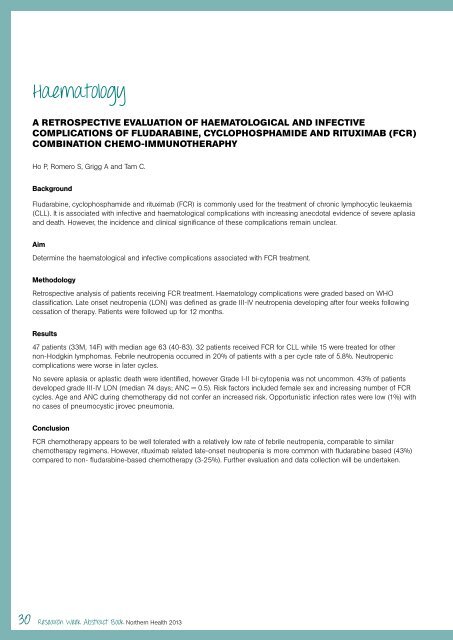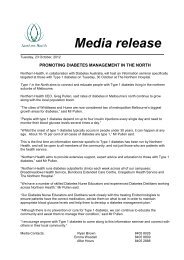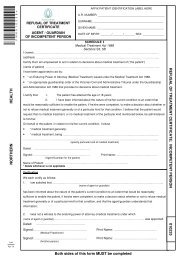Research Week Abstract Book - Northern Health
Research Week Abstract Book - Northern Health
Research Week Abstract Book - Northern Health
Create successful ePaper yourself
Turn your PDF publications into a flip-book with our unique Google optimized e-Paper software.
Haematology<br />
A RETROSPECTIVE EValuaTION OF HAEMAToloGICAL AND INFECTIVE<br />
COMPliCATIONS OF FLUDarabine, CYCloPhosPhamiDE AND RITUXIMAB (FCR)<br />
CombinaTion Chemo-immunoTheraPhy<br />
Ho P, Romero S, Grigg A and Tam C.<br />
Background<br />
Fludarabine, cyclophosphamide and rituximab (FCR) is commonly used for the treatment of chronic lymphocytic leukaemia<br />
(CLL). It is associated with infective and haematological complications with increasing anecdotal evidence of severe aplasia<br />
and death. However, the incidence and clinical significance of these complications remain unclear.<br />
Aim<br />
Determine the haematological and infective complications associated with FCR treatment.<br />
Methodology<br />
Retrospective analysis of patients receiving FCR treatment. Haematology complications were graded based on WHO<br />
classification. Late onset neutropenia (LON) was defined as grade III-IV neutropenia developing after four weeks following<br />
cessation of therapy. Patients were followed up for 12 months.<br />
Results<br />
47 patients (33M, 14F) with median age 63 (40-83). 32 patients received FCR for CLL while 15 were treated for other<br />
non-Hodgkin lymphomas. Febrile neutropenia occurred in 20% of patients with a per cycle rate of 5.8%. Neutropenic<br />
complications were worse in later cycles.<br />
No severe aplasia or aplastic death were identified, however Grade I-II bi-cytopenia was not uncommon. 43% of patients<br />
developed grade III-IV LON (median 74 days; ANC = 0.5). Risk factors included female sex and increasing number of FCR<br />
cycles. Age and ANC during chemotherapy did not confer an increased risk. Opportunistic infection rates were low (1%) with<br />
no cases of pneumocystic jirovec pneumonia.<br />
Conclusion<br />
FCR chemotherapy appears to be well tolerated with a relatively low rate of febrile neutropenia, comparable to similar<br />
chemotherapy regimens. However, rituximab related late-onset neutropenia is more common with fludarabine based (43%)<br />
compared to non- fludarabine-based chemotherapy (3-25%). Further evaluation and data collection will be undertaken.<br />
30<br />
<strong>Research</strong> <strong>Week</strong> <strong>Abstract</strong> <strong>Book</strong> <strong>Northern</strong> <strong>Health</strong> 2013

















